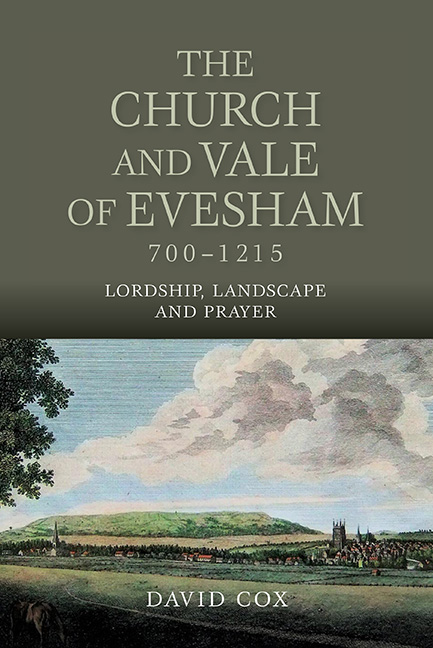Book contents
- Frontmatter
- Dedication
- Contents
- List of Illustrations
- Preface
- Timeline
- List of Abbreviations
- Part I From Minster to Abbey (701–1078)
- Part II Abbot Walter (1078–1104)
- Part III Twelfth-Century Themes (1104–1215)
- Afterword
- Appendix: The Abbots of Evesham to 1215
- Select Bibliography
- Index
- Miscellaneous Endmatter
9 - Abbot Æthelwig Under English and Norman Rule
Published online by Cambridge University Press: 11 May 2021
- Frontmatter
- Dedication
- Contents
- List of Illustrations
- Preface
- Timeline
- List of Abbreviations
- Part I From Minster to Abbey (701–1078)
- Part II Abbot Walter (1078–1104)
- Part III Twelfth-Century Themes (1104–1215)
- Afterword
- Appendix: The Abbots of Evesham to 1215
- Select Bibliography
- Index
- Miscellaneous Endmatter
Summary
IN 1058 Abbot Manni was forced to resign because he had developed a form of paralysis and could no longer carry out his duties. Manni recommended King Edward to appoint as his successor his own deputy (prepositus) Æthelwig, who had entered the monastery as the son of a Worcestershire thegn called Ordwig. In addition to his local knowledge Æthelwig had acquired by 1058 such experience and skill in matters of law and administration that he had managed the see of Worcester for a time on behalf of Bishop Ealdred, perhaps during Ealdred's absence in Germany 1054–55. The king agreed to Manni's request and at Easter 1058 Bishop Ealdred consecrated Æthelwig as abbot of Evesham in a ceremony at Gloucester, while the king was holding his court there. Manni stayed at Evesham and was to live nearly eight more years. During that time Æthelwig made sure that he was looked after day and night by two of the best people available and with help from the abbey servants. Manni remained of sound mind and Æthelwig was careful to follow his advice on important matters. Nevertheless, when Bishop Ealdred resigned in 1062 Æthelwig was a strong and willing candidate to succeed him at Worcester, and thus to leave Evesham. But he was passed over in favour of the more spiritual and more reluctant Wulfstan, the dean of Worcester, whose advocates included the pope. Thereafter Æthelwig directed much of his exceptional energy and skill to increasing the wealth and reputation of his abbey, and the result was that Evesham would emerge from the Norman Conquest not merely unimpaired but actually enhanced. Deeply involved in public affairs, however, he had to leave daily management of the abbey largely in the hands of his deputy, the dean. The monk Ælfric occupied that position in 1070, and by 1077 the holder was called Æthelwine.
During Æthelwig's twenty-year abbacy the number of monks at Evesham increased from twelve to thirty-six; there had probably been twelve, the number of the Apostles, ever since the reform of c.970. The manner in which the twenty-four new places were filled is not known but it is clear that the Norman Conquest brought no immediate influx of recruits from the continent; the abbey had no foreign monks at all in Æthelwig's time.
- Type
- Chapter
- Information
- The Church and Vale of Evesham, 700-1215Lordship, Landscape and Prayer, pp. 78 - 86Publisher: Boydell & BrewerPrint publication year: 2015



